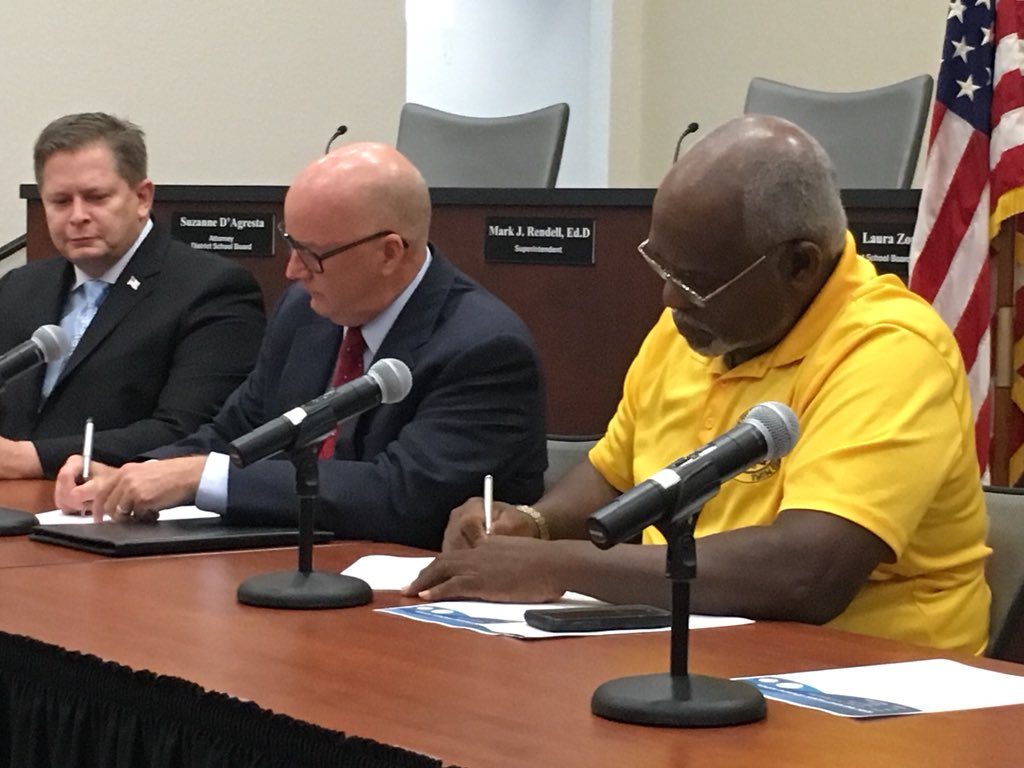INDIAN RIVER COUNTY — In an effort to push for complete desegregation in all schools, the NAACP and school board have reached an agreement to address critical issues regarding black students and faculty.
“This agreement marks a new day, and a new beginning, in addressing the long-lingering issues in the decades-old school desegregation case,” Indian River County National Association for the Advancement of Colored People President Tony Brown said in a statement.
The agreement will focus on specific areas, including new teacher recruitment, employment and monitoring, racial disparities in discipline and the assignment of students to special education programs, officials said. The agreement will also focus on expanded desegregation oversight for student assignments among schools, for transportation and for extracurricular activities.
School board and NAACP members signed the new agreement about 3 p.m. Friday at the School District of Indian River County district office, 6500 57th Street. About 30 to 40 people were in attendance.
But, during the ceremony, Brown made it clear that this agreement is not a celebratory moment.
“This is something that should have been done 50 years ago. We put in some hard work and were hoping we would be further along down the road,” Brown said. “There should be at least two black teachers at every school. It’s problematic for a black child to go from 1st grade through 5th grade without having a black teacher.”
*Note for videos – Click the audio icon in the lower right hand corner for sound.
School officials and the NAACP have been working under the 1994 revised agreement under the 1967 desegregation order to push for more representation of blacks in different areas within the school district.
There are at least 10 elements under the agreement regarding education of black students and hiring more black staff within local schools, Brown said. Partial unitary status, or partial “equal” status, has only been made in three areas – facilities, non-instructional staff and administrative staff.
“It’s partial because all of the requirements of the 1994 agreement have not been met. The school district asked for unitary status on only three of the elements,” Brown said. “It dilutes the effectiveness of the whole order.”
The new 2018 agreement aims to change that, so the school district can attain full unitary status.
“Educational outcomes for African American students in Indian River County have improved greatly in the last three years. For example, the graduation rate for African American students has risen from 65 percent to 80 percent,” Schools Superintendent Mark Rendell said in a statement. “While these increases are very positive, we are not done. Working together with the NAACP, we can build on these gains and ensure that all of our students receive the highest quality education possible.”
A five-member equity committee will operate under the agreement. That committee will report directly to the School Board of Indian River County and monitor and document compliance with the desegregation order, officials said.
The School Board and NAACP executive committee will meet every year to thoroughly review the status of desegregation in county public schools. The work will be done under court supervision under the pending federal court lawsuit Sharpton et al v. School Board of Indian River County.
The suit stems from 1964, when Denise Shaprton and her husband, who are parents of a former student in the county district, claimed that separate and inferior schools were made for black students in the county. U.S. District Court Judge C. Clyde Atkins agreed and issued a desegregation order in 1967, according to reports.
Requirements under the court order were revised in 1994, naming the NAACP as the plaintiff instead of the parents.
The order focused on hiring more black teachers at an accelerated rate until the ratio matched the 17 percent student black population. The order also aimed at closing the black-student achievement gap in the county, reports show.
Under the new 2018 agreement, the equity committee will monitor the school district for three years before the school board can seek unitary status in any remaining areas, officials said. The committee will be in operation for at least five years.
If the remaining requirements under the court order are met by the end of the three-year period, the school district will be entitled to end the desegregation case, officials said. If not, the local NAACP chapter and school officials will discuss an extended period of monitoring compliance with the order.
The joint plan can be found here – IRC NAACP Joint Plan FINAL (8.23.18).
Photos by Nick Samuel
Staff writer Kathleen Sloan contributed to this report.

